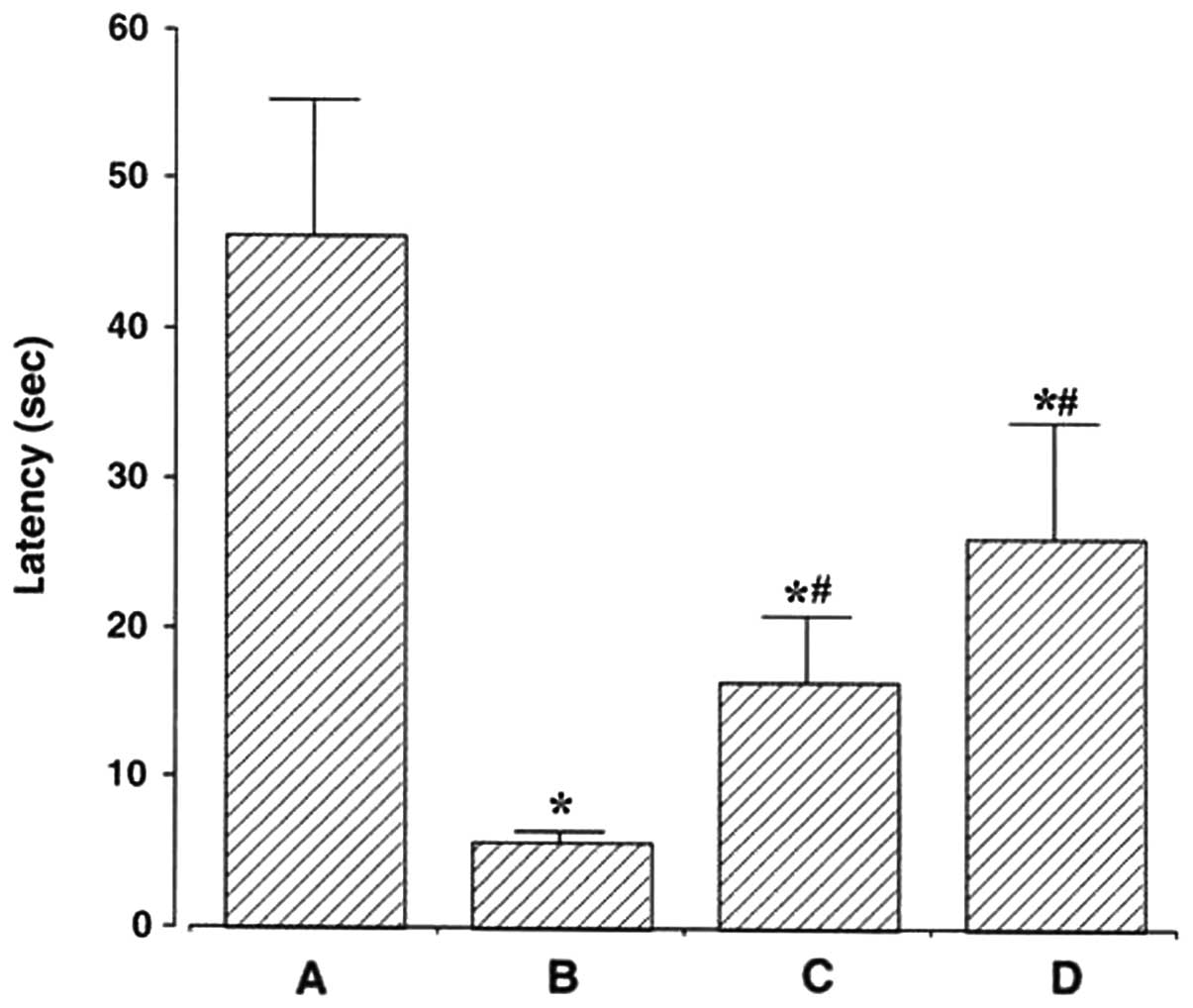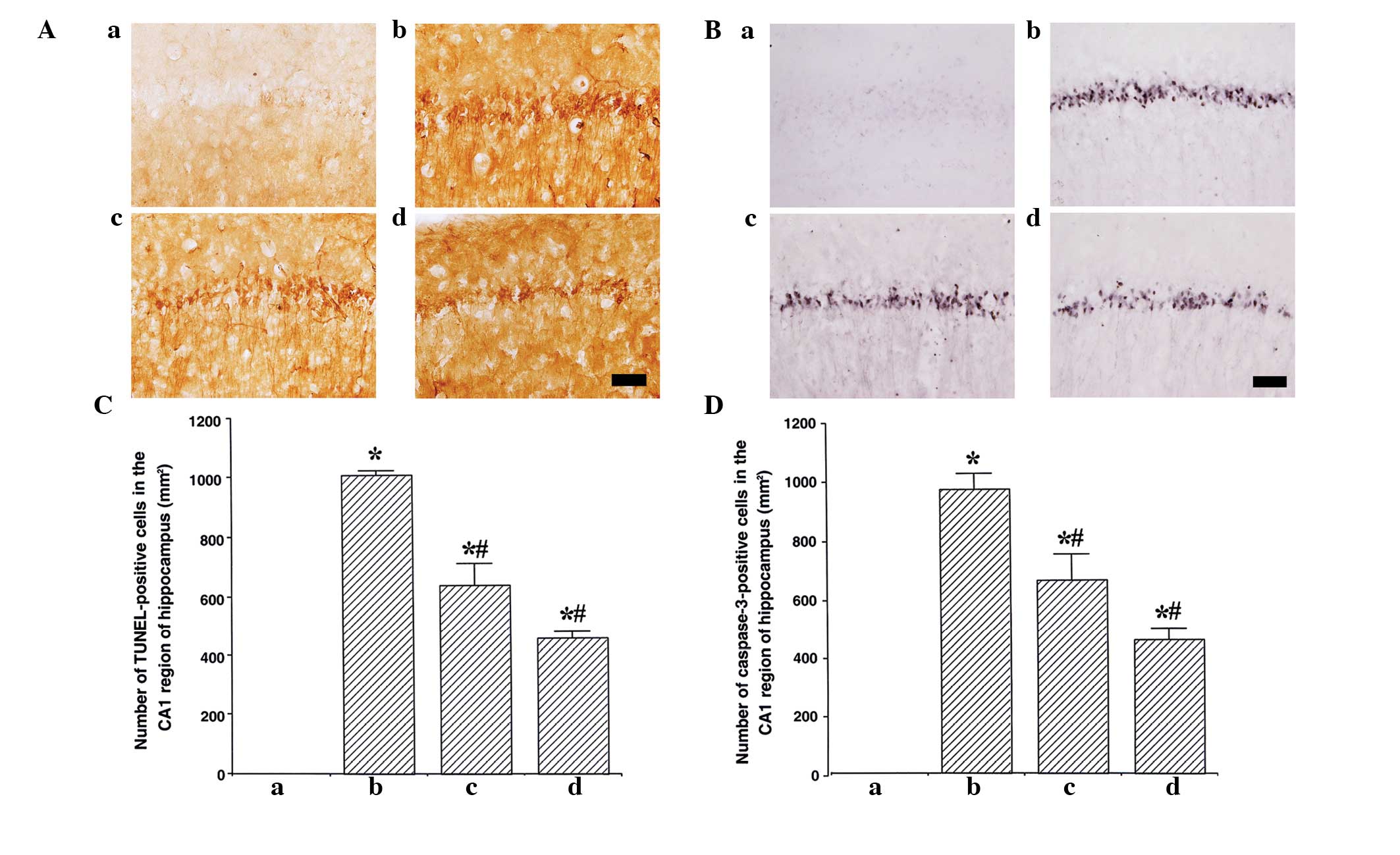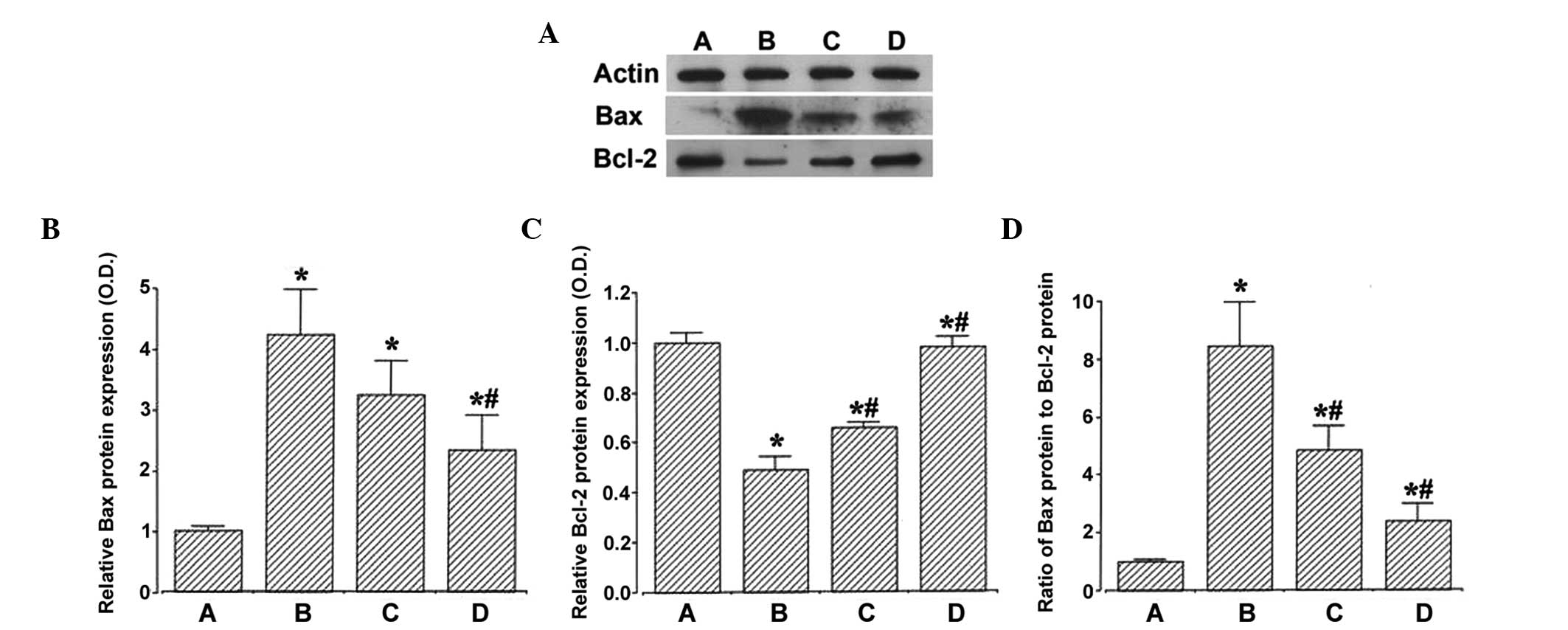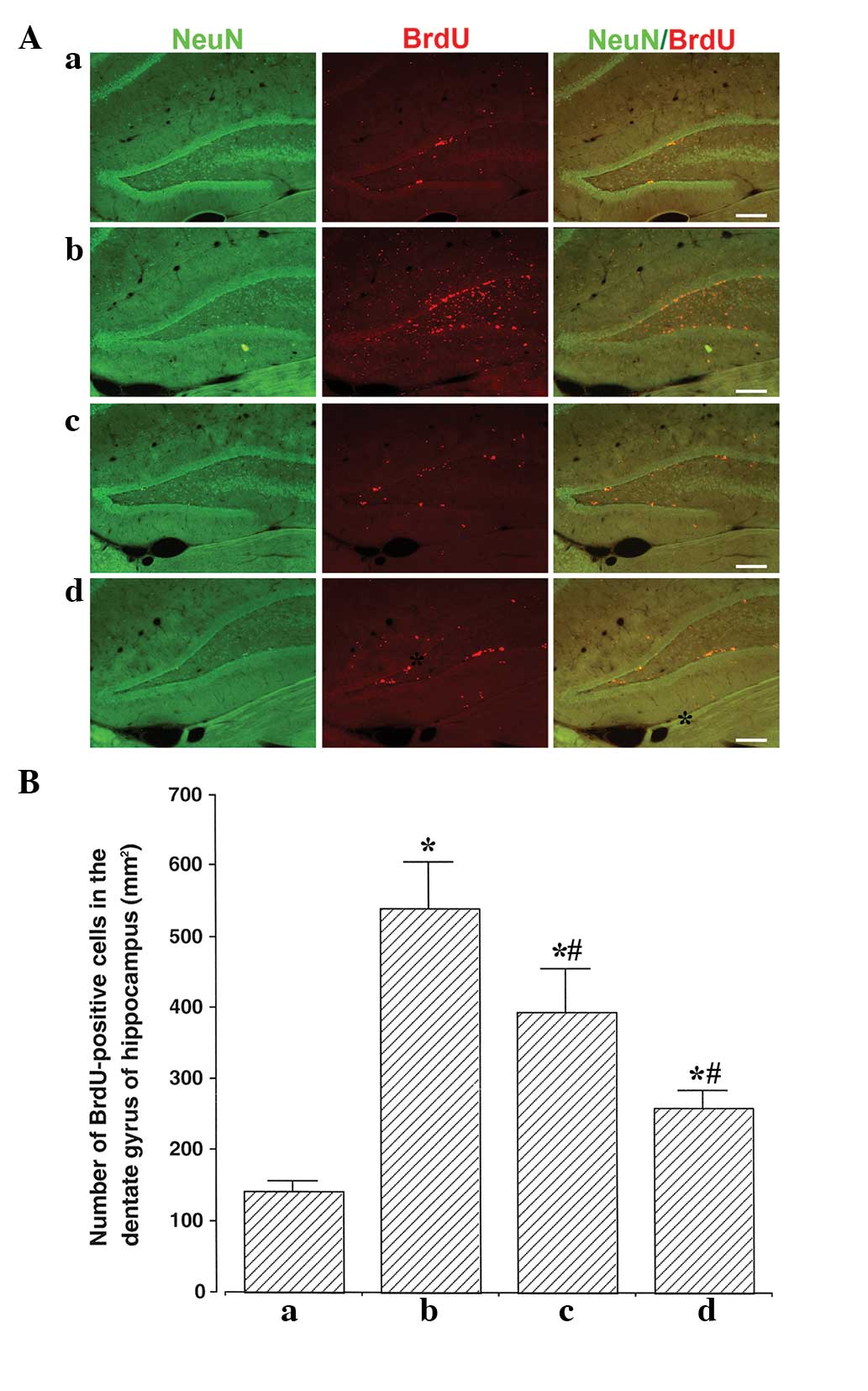|
1
|
Benchoua A, Guégan C, Couriaud C, Hosseini
H, Sampaïo N, Morin D and Onténiente B: Specific caspase pathways
are activated in the two stages of cerebral infarction. J Neurosci.
21:7127–7134. 2001.PubMed/NCBI
|
|
2
|
Dirnagl U, Iadecola C and Moskowitz MA:
Pathobiology of ischaemic stroke: an integrated view. Trends
Neurosci. 22:391–397. 1999. View Article : Google Scholar : PubMed/NCBI
|
|
3
|
Mattson MP, Duan W, Pedersen WA and
Culmsee C: Neurodegenerative disorders and ischemic brain diseases.
Apoptosis. 6:69–81. 2001. View Article : Google Scholar : PubMed/NCBI
|
|
4
|
Hartman RE, Lee JM, Zipfel GJ and Wozniak
DF: Characterizing learning deficits and hippocampal neuron loss
following transient global cerebral ischemia in rats. Brain Res.
1043:48–56. 2005. View Article : Google Scholar : PubMed/NCBI
|
|
5
|
Ko IG, Shin MS, Kim BK, Kim SE, Sung YH,
Kim TS, Shin MC, Cho HJ, Kim SC, Kim SH, Kim KH, Shin DH and Kim
CJ: Tadalafil improves short-term memory by suppressing
ischemia-induced apoptosis of hippocampal neuronal cells in
gerbils. Pharmacol Biochem Behav. 91:629–635. 2009. View Article : Google Scholar
|
|
6
|
Sim YJ, Kim SS, Kim JY, Shin MS and Kim
CJ: Treadmill exercise improves short-term memory by suppressing
ischemia-induced apoptosis of neuronal cells in gerbils. Neurosci
Lett. 372:256–261. 2004. View Article : Google Scholar : PubMed/NCBI
|
|
7
|
Korsmeyer SJ: BCL-2 gene family and the
regulation of programmed cell death. Cancer Res. 59:S1693–S1700.
1999.
|
|
8
|
Kim SE, Ko IG, Kim BK, Shin MS, Cho S, Kim
CJ, Kim SH, Baek SS, Lee EK and Jee YS: Treadmill exercise prevents
aging-induced failure of memory through an increase in neurogenesis
and suppression of apoptosis in rat hippocampus. Exp Gerontol.
45:357–365. 2010. View Article : Google Scholar : PubMed/NCBI
|
|
9
|
Oltvai ZN, Milliman CL and Korsmeyer SJ:
Bcl-2 heterodimerizes in vivo with a conserved homolog, Bax, that
accelerates programmed cell death. Cell. 74:609–619. 1993.
View Article : Google Scholar : PubMed/NCBI
|
|
10
|
Hwang L, Choi IY, Kim SE, Ko IG, Shin MS,
Kim CJ, Kim SH, Jin JJ, Chung JY and Yi JW: Dexmedetomidine
ameliorates intracerebral hemorrhage-induced memory impairment by
inhibiting apoptosis and enhancing brain-derived neurotrophic
factor expression in the rat hippocampus. Int J Mol Med.
31:1047–1056. 2013.PubMed/NCBI
|
|
11
|
Gould E, Tanapat P, Hastings NB and Shors
TJ: Neurogenesis in adulthood: a possible role in learning. Trends
Cogn Sci. 3:186–192. 1999. View Article : Google Scholar : PubMed/NCBI
|
|
12
|
Schmidt W and Reymann KG: Proliferating
cells differentiate into neurons in the hippocampal CA1 region of
gerbils after global cerebral ischemia. Neurosci Lett. 334:153–156.
2002. View Article : Google Scholar : PubMed/NCBI
|
|
13
|
Kempermann G, Kuhn HG and Gage FH: Genetic
influence on neurogenesis in the dentate gyrus of adult mice. Proc
Natl Acad Sci USA. 94:10409–10414. 1997. View Article : Google Scholar : PubMed/NCBI
|
|
14
|
Liu J, Solway K, Messing RO and Sharp FR:
Increased neurogenesis in the dentate gyrus after transient global
ischemia in gerbils. J Neurosci. 18:7768–7778. 1998.PubMed/NCBI
|
|
15
|
Takasawa K, Kitagawa K, Yagita Y, Sasaki
T, Tanaka S, Matsushita K, Ohstuki T, Miyata T, Okano H, Hori M and
Matsumoto M: Increased proliferation of neural progenitor cells but
reduced survival of newborn cells in the contralateral hippocampus
after focal cerebral ischemia in rats. J Cereb Blood Flow Metab.
22:299–307. 2002. View Article : Google Scholar : PubMed/NCBI
|
|
16
|
Tanaka Y, Maehara S, Sumi H, Toki N,
Moriyama S and Sasaki K: Purification and partial characterization
of two forms of urinary trypsin inhibitor. Biochim Biophys Acta.
705:192–199. 1982. View Article : Google Scholar : PubMed/NCBI
|
|
17
|
Nakatani K, Takeshita S, Tsujimoto H,
Kawamura Y and Sekine I: Inhibitory effect of serine protease
inhibitors on neutrophil-mediated endothelial cell injury. J Leukoc
Biol. 69:241–247. 2001.PubMed/NCBI
|
|
18
|
Yamaguchi Y, Ohshiro H, Nagao Y, Odawara
K, Okabe K, Hidaka H, Ishihara K, Uchino S, Furuhashi T, Yamada S,
Mori K and Ogawa M: Urinary trypsin inhibitor reduces C-X-C
chemokine production in rat liver ischemia/reperfusion. J Surg Res.
94:107–115. 2000. View Article : Google Scholar : PubMed/NCBI
|
|
19
|
Cao ZL, Okazaki Y, Naito K, Ueno T,
Natsuaki M and Itoh T: Ulinastatin attenuates reperfusion injury in
the isolated blood-perfused rabbit heart. Ann Thorac Surg.
69:1121–1126. 2000. View Article : Google Scholar : PubMed/NCBI
|
|
20
|
Yano T, Anraku S, Nakayama R and Ushijima
K: Neuroprotective effect of urinary trypsin inhibitor against
focal cerebral ischemia-reperfusion injury in rats. Anesthesiology.
98:465–473. 2003. View Article : Google Scholar : PubMed/NCBI
|
|
21
|
Kim SE, Ko IG, Park CY, Shin MS, Kim CJ
and Jee YS: Treadmill and wheel exercise alleviate
lipopolysaccharide-induced short-term memory impairment by
enhancing neuronal maturation in rats. Mol Med Rep. 7:31–36.
2013.
|
|
22
|
Bendel O, Bueters T, von Euler M, Ove
Ogren S, Sandin J and von Euler G: Reappearance of hippocampal CA1
neurons after ischemia is associated with recovery of learning and
memory. J Cereb Blood Flow Metab. 25:1586–1595. 2005. View Article : Google Scholar : PubMed/NCBI
|
|
23
|
von Euler M, Bendel O, Bueters T, Sandin J
and von Euler G: Profound but transient deficits in learning and
memory after global ischemia using a novel water maze test. Behav
Brain Res. 166:204–210. 2006. View Article : Google Scholar
|
|
24
|
Schmidt-Kastner R and Freund TF: Selective
vulnerability of the hippocampus in brain ischemia. Neuroscience.
40:599–636. 1991. View Article : Google Scholar : PubMed/NCBI
|
|
25
|
Kitagawa K, Matsumoto M, Tsujimoto Y,
Ohtsuki T, Kuwabara K, Matsushita K, Yang G, Tanabe H, Martinou JC,
Hori M and Yanagihara T: Amelioration of hippocampal neuronal
damage after global ischemia by neuronal overexpression of BCL-2 in
transgenic mice. Stroke. 29:2616–2621. 1998. View Article : Google Scholar : PubMed/NCBI
|
|
26
|
Merry DE and Korsmeyer SJ: Bcl-2 gene
family in the nervous system. Annu Rev Neurosci. 20:245–267. 1997.
View Article : Google Scholar : PubMed/NCBI
|
|
27
|
Upadhyay D, Panduri V, Ghio A and Kamp DW:
Particulate matter induces alveolar epithelial cell DNA damage and
apoptosis: role of free radicals and the mitochondria. Am J Respir
Cell Mol Biol. 29:180–187. 2003. View Article : Google Scholar : PubMed/NCBI
|
|
28
|
Ekdahl CT, Kokaia Z and Lindvall O: Brain
inflammation and adult neurogenesis: the dual role of microglia.
Neuroscience. 158:1021–1029. 2009. View Article : Google Scholar
|
|
29
|
Maciejewski R, Burdan F, Burski K, Madej
B, Ziemiakowicz R, Dabrowski A and Wallner G: Selected biochemical
parameters and ultrastructural picture of pancreas due to
Ulinastatin treatment of experimental acute pancreatitis. Exp
Toxicol Pathol. 56:305–311. 2005. View Article : Google Scholar : PubMed/NCBI
|
|
30
|
Inoue K, Takano H, Shimada A, Yanagisawa
R, Sakurai M, Yoshino S, Sato H and Yoshikawa T: Urinary trypsin
inhibitor protects against systemic inflammation induced by
lipopolysaccharide. Mol Pharmacol. 67:673–680. 2005. View Article : Google Scholar
|
|
31
|
Masuda T, Sato K, Noda C, Ikeda KM,
Matsunaga A, Ogura MN, Shimizu K, Nagasawa H, Matsuyama N and Izumi
T: Protective effect of urinary trypsin inhibitor on myocardial
mitochondria during hemorrhagic shock and reperfusion. Crit Care
Med. 31:1987–1992. 2003. View Article : Google Scholar : PubMed/NCBI
|
|
32
|
Chen CC, Liu ZM, Wang HH, He W, Wang Y and
Wu WD: Effect of ulinastatin on renal ischemia-reperfusion injury
in rats. Acta Pharmacol Sin. 25:1334–1340. 2004.PubMed/NCBI
|
|
33
|
Sung YH, Shin MS, Ko IG, Kim SE, Kim CJ,
Ahn HJ, Yoon HW and Lee BJ: Ulinastatin suppresses
lipopolysaccharide-induced prostaglandin E2 synthesis and nitric
oxide production through the downregulation of nuclear factor-κB in
BV2 mouse microglial cells. Int J Mol Med. 13:1030–1036. 2013.
|


















